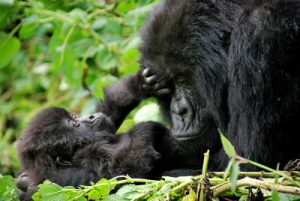Uganda: Gorillas’ “Baby Boom”
Mountain gorillas, threatened by poaching, have taken advantage of the quarantine to increase their numbers.
An endangered species
Bwindi Impenetrable Forest National Park in Uganda is a UNESCO World Heritage Site. It is home to about 400 mountain gorillas, almost half of the world’s mountain gorilla population. These gorillas are found only in Uganda, Rwanda, and the Democratic Republic of Congo.
However, the closure of the park because of the coronavirus has left the way open for poaching. In June 2020, Rafiki, a 25-year-old silverback gorilla very popular in the park, was killed by a poacher. But he is only one example among a multitude of victims of illegal hunting. The mountain gorilla is an endangered species with barely a thousand representatives alive.
A happy event
However, the Ugandan government is seeing a real “baby boom” among these primates. Seven children have been born in Bwindi since the beginning of 2020, including five since the end of April. This is more than double the number of births in 2019.
This happy event comes as the park timidly reopens to the public. Visits to gorilla homes account for more than 60% of Uganda’s revenue from its protected areas. Tourism is a major resource of the country, and its decline due to COVID-19 has weighed on the economy. Sanitary measures have since been put in place and tourists can come and admire the newborns. The gorillas can then in turn support the Ugandan economy.
In 2018, the International Union for Conservation of Nature removed the mountain gorilla from the list of critically endangered species. Initiatives such as the creation of the Bwindi Park are a step towards greater protection of endangered animals.
Populations of these primates have increased in recent decades thanks to the efforts of the Ugandan, Congolese and Rwandan authorities. For example, they have developed anti-poaching and veterinary patrols, trained to approach gorillas. Penalties for poaching have also been tightened. In July 2020, Rafiki’s killer was sentenced to 11 years in prison. The mountain gorillas and their young can sleep much more peacefully.
Sources: BBC, mediaterre, Africanews
Photo Credits : Rod Waddington/Creative Common
Encourage us if you like positive stories!






